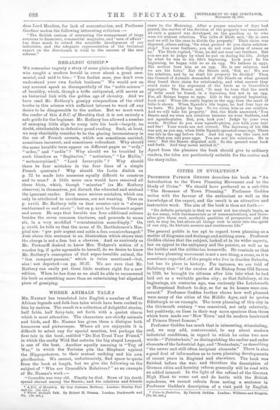WHERE ANIMALS TALK:S.
NASSAU has translated into English a number of West African legends and folk-lore tales which have been recited to him by natives. The result is a collection of delightful stories, half fable, half fairy-tale, set forth with a quaint charm which is most attractive. The characters are chiefly animals and birds, and Mr. Nassau has given them a dialogue both humorous and picturesque. Where all are enjoyable it is difficult to select any for special mention, but perhaps the first tale in the book, entitled "Do Not Trust Your Friend," in which the crafty Wild Rat outwits the big stupid Leopard, is one of the best. Another equally amusing is "Tug of War," in which the Tortoise pits the Elephant against the Hippopotamus, to their mutual undoing and his own glorification. We cannot, unfortunately, find space to quote from the book at length, but we give the following on the subject of "Who are Crocodile's Relatives ? " as an example of Mr. Nassau's work :-
" Crocodile was very old. Finally he died. News of his death spread abroad among the Beasts ; and his relatives and friends
A.B.C. of Heraldry. By Guy Cadogan Rothery. London ; Stanley Paul and Co. [6s. net, t Where Animals Talk. By Robert IL Nassau. London; Duckworth and Co. Ds. net.] came to the Mourning. After a proper number of days had passed, the matter of the division of the property was mentioned. At once a quarrel was developed, on the question as to who were his nearest relatives. The tribe of 'Birds said, 'Ho is ours and we will be the ones to divide the property.' Their claim was disputed, others asking, 'On what ground do you claim relation- ship P You wear feathers ; you do not wear plates of armor as he.' The Birds replied, True, he did not wear our feathers. But you are not to judge by what he put on during his life. Judge by what he was in his life's beginning. Look you! In his beginning, he began with us as an egg. We believe in eggs. His mother bore him as an egg. He is our relative, and we are his heirs.' But the Beasts said, 'Not so ! We are his relatives, and by us shall his property be divided.' Then the Council of Animals demanded of the Beasts on what ground they based their claim for relationship, and what answer they could make to the argument of the birds as to Crocodile's egg-origin. The Beasts said, It may be true that the mark of tribe must be found, in a beginning, but not in an egg. For, all Beings began as eggs. Life is the original beginning. Look you! When life really begins in the egg, then the mark of tribe is shown. When Ngando's life began, he had four legs as we have. We judge by legs. So we claim him as our relative. And we will take his property.' But, the Birds answered, ' You Beasts said we were not relatives because we wear feathers, and not ngando-plates. But, you, look you! judge by your own words. Neither do you wear ngando-plates, you with your hair and fur ! Your words are not correct. The beginning of his life was not, as you say, when little Ngando sprouted some legs. There was life in the egg before that. And his egg was like ours, not like what you call your eggs. You are not his relatives. He is ours.' But the Beasts disputed still. So the quarrel went back and forth. And they never settled it."
Apart from the pleasure the book should give to ordinary readers, the tales are particularly suitable for the reciter and the story-teller.














































 Previous page
Previous page